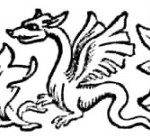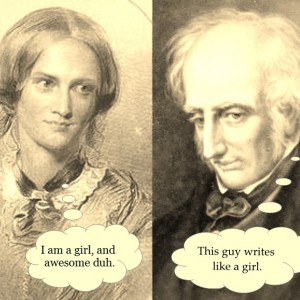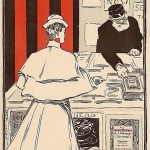Origin and Progress of Printing
by Frederick Saunders (1839)
 (I thought it would be interesting to take a look at the ideals of an early publisher, a pioneer in modern printing of his day. Much like many of us are pioneers of modern web and digital printing. The text was written in 1839. I’m sure it was cutting edge at the time. History is history, so the author’s take might be more accurate than a history of printing written even today.)
(I thought it would be interesting to take a look at the ideals of an early publisher, a pioneer in modern printing of his day. Much like many of us are pioneers of modern web and digital printing. The text was written in 1839. I’m sure it was cutting edge at the time. History is history, so the author’s take might be more accurate than a history of printing written even today.)
There appears to be no reason to doubt that, from a very remote period in the history of the world, devices were used for the purpose of transmitting to after times the records of important events, but these are for the most part more a matter of curiosity than of positive information. Of the Origin of Printing as now practised, the Rev. Archdeacon Coxe gives the following account in his History of the House of Austria:—“It took its rise about the middle of the fifteenth century, and in the course of a few years reached that height of improvement which is scarcely surpassed even in the present times. The Invention was at first rude and simple, consisting of whole pages carved on Blocks of Wood, and only impressed on one side of the leaf: the next step was the formation of moveable Types in Wood, and they were afterwards cut in Metal, and finally rendered more durable, regular, and elegant, by being Cast, or Founded.
“The consequence of this happy and simple discovery was a rapid series of improvements in every art and science, and a general diffusion of knowledge among all orders of society. Hitherto the tedious, uncertain, and expensive mode of multiplying books by the hand of the Copyist, had principally confined the treasures of learning to Monasteries, or to persons of rank and fortune. Yet, even with all the advantages of wealth, Libraries were extremely scarce and scanty; and principally consisted of books of devotion and superstition, legends, or the sophistical disquisitions of the schoolmen. An acquaintance with the Latin classics was a rare qualification, and the Greek language was almost unknown in Europe; but the Art of Printing had scarcely become general before it gave a new impulse to genius and a new spirit to inquiry. A singular concurrence of circumstances contributed to multiply the beneficial effects derived from this invention, among which the most considerable were the protection afforded to literature and the arts by the States of Italy, and the diffusion of Greek learning by the literati who sought an asylum in Europe after the capture of Constantinople.
“A controversy has arisen concerning the first discoverer of the art of Printing, between the three towns of Haerlem, Mentz, and Strasburg, each, from a natural partiality, attributing it to their own countryman. The dispute, however, has turned rather on words than facts; and seems to have arisen from the different definitions of the word “Printing.” If we estimate the discovery from the invention of the principle, the honour is unquestionably due to Laurence Coster, a native of Haerlem, who first found out the method of impressing characters on paper, by means of carved blocks of wood. If moveable types be considered as a criterion, the merit of the discovery is due to John Gutenberg, of Mentz; and Schoeffer, in conjunction with Faust, was the first who founded Types of Metal.”—Coxe, vol. i. p. 421. 8vo.
Although some attempts have been made to support a different statement, it is pretty generally admitted that William Caxton, who had lived abroad and learned the art there, was the person who introduced Printing into England; in this Stowe, Leland, and others agree, that “in the almonry at Westminster, the Abbot of Westminster erected the first Press for Book-printing that ever was in England, about the year 1471; and where Wm. Caxton, Citizen and Mercer, who first brought it into England, first practised it.”
The first work printed in England was “The Recueil of The Historeys of Troye,” of which Caxton thus speaks:—“Thus end I this book, &c., and for as moche as in wrytyng of the same my penne is worn, myne hande wery, and myne eyen dimmed, with overmoche lokyng on the whit paper—and that age crepeth on me dayly—and also because I have promised to dyverce gentilmen and to my frendes to adresse to them as hastely as I myght this said book, therefore I have practysed and learned at my grete charge and dispense to ordayne this sayd book in prynte after the manner and forme as ye may here see, and is not wreten with penne and ynke, as other bokes ben, to thende that every man may have them att ones; for all the books of this storye named the Recule of the Historyes of Troyes thus emprynted as ye here see were begonne in oon day and also finished in oon day,” &c. In another place he enumerates the works he had printed thus:—“When I had accomplished dyvers workys and historyes translated out of Frenshe into Englyshe, at the requeste of certayn lords, ladyes, and gentylmen, as the Recule of the Historyes of Troye, the Boke of Chesse, the Historye of Jason, the Historye of the Mirrour of the World, I have submysed myself to translate into English, the Legende of Sayntes, called Legenda Aurea in Latyn—and Wylyam Erle of Arondel desyred me—and promysed to take a resonyble quantyte of them—sente to me a worshipful gentylman—promising that my sayd lord should during my lyf give and grant to me a yearly fee, that is to note a bucke in sommer, and a doo in wynter,” &c.
It appears that Caxton continued his employment at Westminster, with considerable success, until his death, which occurred in 1491. He seems to have been extensively patronised, and to have been a person of great moral worth. He is supposed to have lived to beyond the age of eighty.
Wynkyn de Worde, who was an assistant, and afterwards succeeded Caxton, was a foreigner, born in the dukedom of Lorrain. He made great improvements, especially in the form of his types. Most of his books now remaining, were printed in Fleet Street, in St. Bride’s Parish, at the sign of the Sun. He died in 1534.
Richard Pynson, who had been brought up under Caxton, set up a Press at Temple Bar, and was the first who obtained the patent of King’s Printer; he died in 1529.
After this, Printing was practised very generally, not only in London, but in many other places, especially Oxford and Cambridge, both which Universities obtained the exclusive right, which they still retain, of Printing all Bibles and Prayer Books; that is, with the exception of the person holding the patent of King’s Printer, who also has this right.
The principle of moveable Types having been once introduced, little room was left for improvement, beyond the slight variations in the form of the Letters, which, as a matter of taste, would always be liable to fluctuate: a comparison of works, printed at different periods, will exemplify this.
An experiment was made some years since, in Logographic, or Word Printing; the Words of most frequent occurrence being cast together, instead of setting them up in single Letters; but it does not appear to have succeeded, or to have been generally adopted, though a Volume, at least, was printed on this plan, which the Publishers of this little work happen to have in their possession.
In the improvement of the Printing Press, and the manufacture of Printing Ink, a larger sphere was opened, inasmuch as to the advancement of these, Printing must be ever indebted for its degrees of excellence.
Printing Ink is a sort of Black Varnish, the making of which is still a secret in the hands of the manufacturers, so far as its finer qualities are concerned.
Its requisites are, that it should have a sufficient, and not too great a degree of tenacity; that it should produce a perfectly black impression, and that it should dry quickly: in proportion as the Ink is deficient in these qualities, it will be liable to injure the paper, or produce specks, to surround the printing with a yellow hue, from the too great preponderance of the oily ingredients; or to soil the paper during the subsequent processes. The excellence of the Printing of Baskerville was chiefly attributable to his discoveries in the art of Ink Making. The late Mr. Bulmer, also, who printed some of the most splendid works of the last half century, was very successful in his experiments. The manufacture is now in the hands of several persons, who are eminent in this art, and who have made it a distinct branch of business.
- 100 Screenwriting Ideas to Get You Writing - January 20, 2026
- 100 Winter Storm Writing Prompts - January 17, 2026
- 100 Haunted House Story Starters: Craft Your Scariest Tale Yet - January 10, 2026



